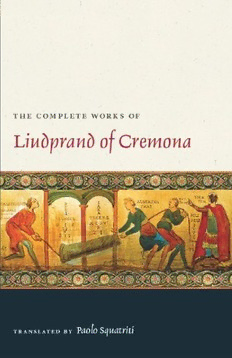
The Complete Works of Liudprand of Cremona PDF
Preview The Complete Works of Liudprand of Cremona
THE COMPLETE WORKS OF LIUDPRAND OF CREMONA medieval texts in translation editorial director Thomas F. X. Noble University of Notre Dame editorial board Paul Dutton Simon Fraser University Geoffrey Koziol University of California, Berkeley Carol Lansing University of California at Santa Barbara Barbara H. Rosenwein Loyola University of Chicago Liudprand of Cremona THE COMPLETE WORKS OF LIUDPRAND OF CREMONA Translated with an introduction and notes by Paolo Squatriti The Catholic University of America Press Washington, D.C. Copyright 2007 The Catholic University of America Press All rights reserved The paper used in this publication meets the minimum requirements of American National Standards for Information Science—Permanence of Paper for Printed Library materials, ansi z39.48-1984. ∞ Library of Congress Cataloging-in-Publication Data Liudprand, Bishop of Cremona, d. ca. 972. [Works. English. 2007] The Complete works of Liudprand of Cremona / translated by Paolo Squatriti. p. cm.—(Medieval texts in translation) Includes bibliographical references and index. isbn 978-0-8132-1506-8 (pbk. : alk. paper) 1. Europe—History— 476–1492. 2. Otto I, Holy Roman Emperor, 912–973. 3. Nicephorus II Phocas, Emperor of the East, 912–969. I.Squatriti, Paolo, 1963– II. Title. III. Series. d117.a2l513 2007 940.1'44—dc22 2007011013 contents Preface vii A Note on this Translation vii / A Note on Liudprand’s Calendar viii Abbreviations xi Introduction 3 Liudprand’s Literary Aliases 3 / Liudprand as Wreaker of Retribution 8 / Liudprand as Homilist 18 / Liudprand as Imperial Apologist 24 / Liudprand as Emissary 29 the complete works of liudprand of cremona Retribution 41 Book One 41 / Book Two 71 / Book Three 108 / Book Four 139 / Book Five 168 / Book Six 195 Homily 203 Concerning King Otto 219 The Embassy of Liudprand 238 Bibliography 285 Index 291 preface a note on this translation This translation of Liudprand’s known writings was inspired by Thomas Noble, whom I wish to thank both for his original idea and for his later suggestions. The translation depends on the edi- tion of Liudprand’s works by Paolo Chiesa. Chiesa improved on the previous editions in several regards, for example, by including Liudprand’s sermon within the Liudprandine canon and by clari- fying the process of composition leading to the variant versions of Retribution extant today.1 Chiesa’s new edition thus offered an excel- lent opportunity for producing a new English translation of all the works of one of the most informative, and certainly the most entertaining, writers of the tenth century. In a period when many of Liudprand’s themes are of acute interest, from conceptions of European community to ideas of transgressive sexuality, from in- tercultural encounter to the creation of new legitimacies for impe- rial power, the works of Liudprand have a lot to offer. The translations are my own, including those of the well-known Liudprandine texts that have been translated into English before. Unfortunately the older translations are no longer in print, yet it would have been much harder to finish the translation without the reassurance of F. A. Wright’s 1930 translation of the then-known Works of Liudprand of Cremona and B. Scott’s 1993 rendition of the 1. P. Chiesa, Liutprando di Cremona e il codice di Frisinga Clm 6388 (Turnholt: Brepols, 1994). vii viii preface Constantinopolitan Embassy.2 I am further indebted to Ross Balza- retti for sharing some of his work on Liudprand with me, to Ray Van Dam and Basil Dufallo for help on some difficult passages, and to Carole Burnett, the editor of this volume. The remaining misunderstandings of Liudprand’s words are entirely my responsi- bility, however. The scriptural quotations with which Liudprand laced his writ- ings are rendered through the Douai Vulgate, somewhat modified to match Liudprand’s text (or recollection). As for the notes to the translation, they seek to ease the task of students in unraveling Liudprand’s culture; I have tried to restrict references in the notes to Anglophone sources, imagining the main audience for a transla- tion like this will find these most useful. In this translation the names of various protagonists in the nar- rative do not retain the idiosyncratic forms Liudprand gave them. His willingness to spell names in different ways, even in differ- ent alphabets, is a distinctive sign of his literary style, but creates confusion for modern readers. Though the names are rendered in standard form here, readers should keep in mind the author’s vola- tile onomastics. My translation is dedicated to Giacomo, whose precocious taste for Liudprand’s stories made my work more fun during a difficult conjuncture in our family’s life. a note on liudprand’s calendar In the early Middle Ages writers used the Roman names for months, as we do today. Like most post-Carolingian writers, Li- udprand also preferred the Roman system for denoting days of the month, though he was capable of employing Christian feasts, too. The Roman calendar, widely adopted throughout the Medi- 2. B. Scott, Liudprand of Cremona. Relatio de Legatione Constantinopolitana (London: Bris- tol Classical Press, 1993); F. Wright, The Works of Liudprand of Cremona (London: Dut- ton, 1930). preface ix terranean basin and favored by Christian chronographers well into the Middle Ages, called the first day of the month the calends. The nones fell on the seventh day of the four months with 31 days (March, May, July, October), and the ides on the fifteenth. Though the length of the other eight months varied, the nones came on their fifth day, and the ides on the thirteenth day. Calends, nones, and ides were the cardinal points of Liudprand’s short-term dating system.
